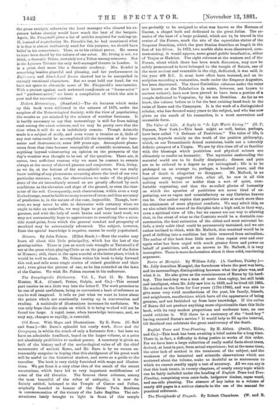Modern Meteorology. (Stanford.)—The six lectures which make up this book
were delivered in the autumn of 1878, under the auspices of the Meteorological Society, with the view of popularising the results as yet, attained by the science of weather forecasts. It is hardly necessary to say that meteorology is still far from taking rank among the exact sciences, and we may be pretty sure that the time when it will do so is indefinitely remote. Though Aristotle made it a subject of study, and even wrote a treatise on it, little of any real value could be accomplished till the invention of the baro- meter and thermometer, some 200 years ago. Atmospheric pheno- mena from that time became susceptible of scientific treatment, but anything beyond volunteering an_ opinion on the prospects of the day's weather was thought to be out of the question. There are, it seems, two sufficient reasons why we must be content to remain always at the mercy of shrewd guesses and conjecture. First, living, as we do, at the bottom of the atmospheric ocean, we can really know nothing of any phenomena occurring above the level of our own particular stratum ; next, the observations we make of the physical state of the air immediately around us are greatly affected by such conditions as the elevation and slope of the ground, or even the char- acter of the soil. Consequently, such observations, within even a very limited range, must be liable to many sources of error, and thus accuracy of prediction is, in the nature of the case, impossible. Though, how- ever, we may never be able to determine with certainty when we ought to take an umbrella, we may hope to get beyond mere rustic guesses, and with the help of more brains and more hard work, we may not unreasonably hope to approximate to something like a scien- tific stand-point, from which the general comfort and prosperity of mankind may be substantially advanced. The subject, however, from the special knowledge it requires, cannot be easily popularised.


































 Previous page
Previous page